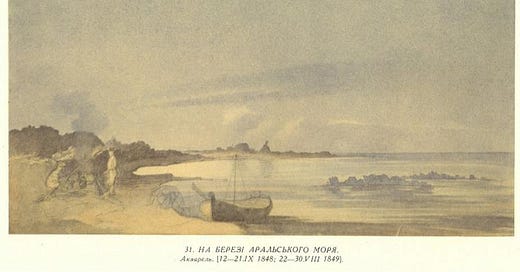A 'luminous home of waters'
Listen to Derek Attridge reciting the final stanza of a brilliant poem by Matthew Arnold (you might even enjoy reading along with him!)
‘Sohrab and Rustum’ by Matthew Arnold
But the majestic river floated on, Out of the mist and hum of that low land, Into the frosty starlight, and there moved, Rejoicing, through the hush'd Chorasmian waste, Under the solitary moon;—he flow'd Right for the polar star, past Orgunjè, Brimming, and bright, and large; then sands begin To hem his watery march, and dam his streams, And split his currents; that for many a league The shorn and parcell'd Oxus strains along Through beds of sand and matted rushy isles— Oxus, forgetting the bright speed he had In his high mountain-cradle in Pamere, A foil'd circuitous wanderer—till at last The long'd-for dash of waves is heard, and wide His luminous home of waters opens, bright And tranquil, from whose floor the new-bathed stars Emerge, and shine upon the Aral Sea.
What we love about this poem…
These are the final lines of a long dramatic poem in the style of Homer that tells a gripping tale full of anguish in which a father accidentally kills his son.
‘Sohrab and Rustum’ was suggested by one of our readers, literature professor Derek Attridge, who told us: ‘I learned these lines at school and have never forgotten them.’
Part of what makes this poem so memorable—and such a joy to say out loud—is the many evocative place names Arnold features. Some of these have become bleakly poignant; as Professor Attridge points out, ‘the Aral Sea is no longer what it was in Arnold’s time, the third-largest lake in the world, but an area of desert with smaller expanses of water.’ The painting below, from the same period as the poem, shows the Aral Sea as it is in Arnold’s poem.
‘Sohrab and Rustum’ appeared in Arnold’s collection of 1853 entitled Poems: A New Edition. Another famous poem from this collection is ‘The Scholar-Gipsy’, which his friend and fellow poet Arnold Clough highly praised. Arnold’s reply to Clough’s praise is illuminating: ‘I am glad you like the Gipsy Scholar, but what does it do for you? Homer animates—Shakespeare animates—in its poor way I think Sohrab and Rustum animates—the Gipsy Scholar at best awakens a pleasing melancholy.’ In Arnold’s view, people want ‘something to animate and ennoble them … I believe a feeling of this kind is the basis of my nature—and of my poetics.’ (source: Poetry Foundation, entry on Arnold)
About the Author
Matthew Arnold (1822-88) was one of the foremost poets, writers, and reformers of the Victorian era. He started his career as a school inspector, a position that allowed him to witness the great changes taking place across England in the nineteenth century. His best-known works, such as the poem ‘Dover Beach’ (1867) and the essay Culture and Anarchy, expressed his apprehensions about industrial modernity and the need for societies to take stock of and cherish—in his words—‘the best which has been thought and said.’
You can read our ‘Dover Beach’ newsletter here.
Curator’s Corner
Today’s poem was suggested by Derek Attridge, professor of English at the University of York and author of many books about poetry and about literature more broadly.
Suggest your own LitHit!
Our last two newsletters have featured poems that were encountered by the curators at school; texts that have stayed with and lived alongside these readers all their lives. We invite you to reflect on the literature that is special to you, and perhaps to think about how and why it has stayed with you. We’d love your thoughts and suggestions!
Just email us with the following information:
Your full name (though please specify if you want to be anonymous in the newsletter itself)
The title of the text you're suggesting
The location of the excerpt within the book, if relevant (e.g., "in the middle of chapter 5"), or the excerpt itself copied into the email or attached to it (in Word)
Where you met this text and what it means to you, in just a few sentences
About LitHits
LitHits helps you make time for reading by bringing you unabridged excerpts from brilliant literature that you can read on the go, anytime or any place. Our curators carefully select and frame each excerpt so that you can dive right in. We are more than a book recommendation site: we connect you with a powerful, enduring piece of literature, served directly to your mobile phone, tablet or computer.
You might also enjoy...
Feedback
We'd love to hear your thoughts on our newsletter:
kshepherdb@yahoo.co.uk
Graphic design by Sara Azmy
All curation content © 2024 LitHits. All rights reserved.




